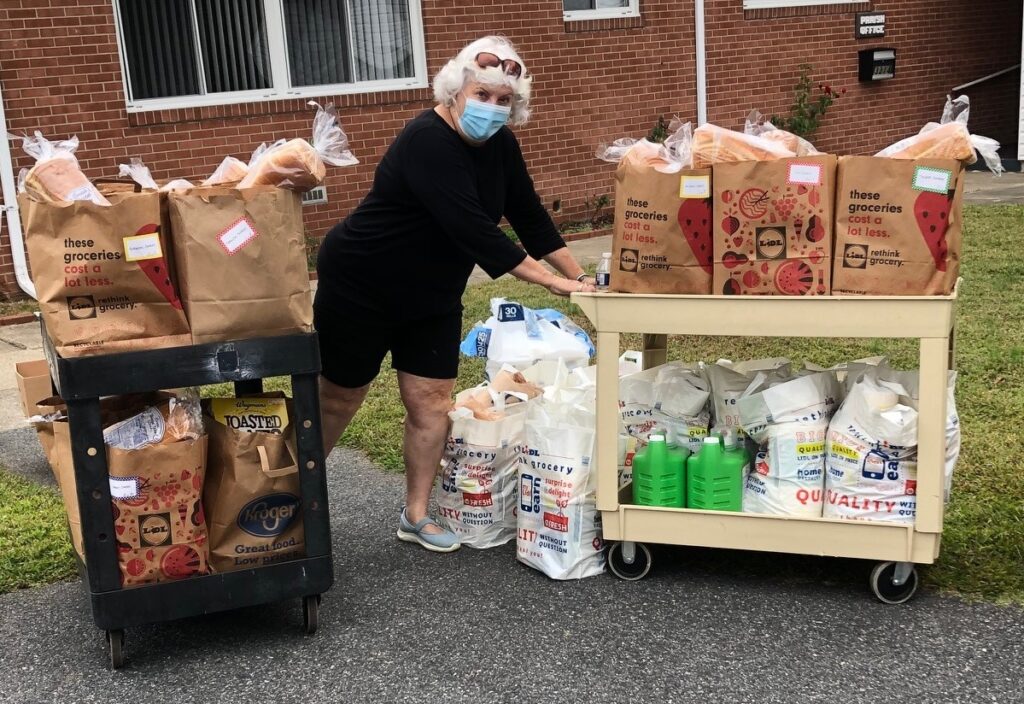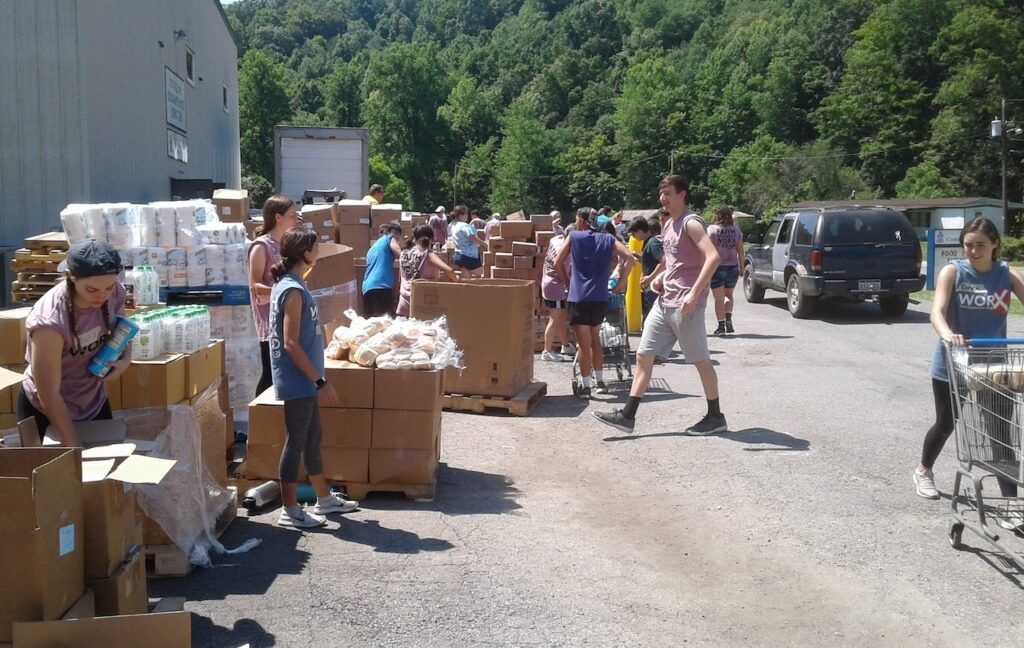Tomorrow, hundreds of thousands of people across the United States will wake up homeless. Many of them are children who will sleep on streets and floors or in car seats, but not in beds. In Henrico County alone, hundreds of school-aged children have no home to call their own.
The Society of St. Vincent de Paul (SVDP) is working to change those staggering statistics.
SVDP began nearly 200 years ago in France as a response to the abject poverty many were living in following the French Revolution. University student Antoine-Frédéric Ozanam and a handful of his friends founded the Conference of Charity and chose St. Vincent de Paul as their patron saint, later changing their name to the Society of St. Vincent de Paul.
A grassroots movement, members went out into the community and served the poor by providing food, medicine, and other assistance. Twelve years later, the first American chapter, or “conference,” was established in St. Louis.
Today, there are more than 4,000 parish-based conferences of SVDP, eight of which are in the Diocese of Richmond. Our diocese has a deep connection to St. Vincent de Paul, as he is our patron saint.
Dan Kearns, executive director for SVDP Richmond Council, promotes the mission by raising awareness of SVDP’s programs, as well as raising funds to meet its needs. He explained that the Richmond Council’s 300 volunteers work to provide assistance to those they call “neighbors in need.”
“Our work has two facets: to be and see the face of Christ in those we serve, and to help prevent homelessness,” said Kearns.
The first diocesan SVDP conference began in 2016 at St. Matthew, Virginia Beach, and St. Michael, Glen Allen, with a few members and $1,000. Now, there are eight conferences in the Richmond Council, which began in 2021, that have raised hundreds of thousands of dollars.
“It started as a trickle that then became a wave quickly,” Kearns said.
Word of SVDP’s work in the community traveled quickly. Public school systems, churches, and the Department of Social Services often provide contact information for SVDP as a resource to those in need. In 2023, the Richmond Council’s SVDP conferences assisted 8,000 people in a variety of ways.
Vincentian volunteers are unique as they take part in “home visits” in which they go directly to those in need, rather than having those in need travel to them. Kearns said that most people are more comfortable and less overwhelmed in their own homes, and it’s easier to identify individual needs when volunteers see their living situation.

Though 90% of the people SVDP serves are not Catholic, faith is still the root of their work.
“You’re putting what you learn on Sundays into action,” said Kearns. “Catholic teaching tells us to proclaim the dignity of man and their fundamental rights. Having adequate housing for all promotes the dignity of our fellow man, and as Catholics, we are called to support this and actively work to try and help those who are falling short.”
A lot of what SVDP helps with are things many take for granted: providing a mattress, paying for a mechanic, creating a budget, etc. Kearns explained that these seemingly minor things can have a major domino effect on struggling families: If someone who is living paycheck-to-paycheck has their car break down and they can’t afford to have it fixed, they could lose their job. If they lose their job, they could lose their home; if they lose their home, they could lose their good health.
SVDP’s Car Repair Fund was created for situations just like this. SVDP also offers assistance in securing housing, utilities, furniture, food, and more. To help raise funds, SVDP owns and operates a thrift store in Richmond, the profits of which directly support the society’s outreach programs.
Recently, SVDP Richmond Council kicked off a new program called Motel 2 Home, aimed at moving families out of extended-stay motels and into secure housing. Its goal is to stop homelessness before it starts.
Some families stay at motels for weeks, months, or even longer. People sleeping in motels or cars, or simply “couch surfing” are members of what’s called the “hidden homeless.” They have a roof over their head, but it’s not really their roof. Though they may have jobs, they may not have enough money saved to put down a deposit on an apartment, they may have bad credit, or they may have past evictions on their record. They are in limbo. That’s where SVDP comes in.
“These people are literally on the very edge of homelessness. They are one knock on the door away from the streets,” said Kearns.
For families who qualify, SVDP pays for moving costs, a security deposit, and the first month’s rent. They repair their cars, clear previous eviction debt, and help with securing furniture. To be eligible for the program, individuals or families need to have been living in a motel for more than 30 days, be employed, have reliable transportation, and can’t spend more than 40% of their income on housing.
After a family is housed, SVDP meets regularly with them for 12 months to ensure they are thriving; the society will continue to help with food or utilities if needed. SVDP is currently piloting this program with six families.
A major hurdle to this program is finding landlords willing to work with SVDP. Though they have identified some who open their hearts and doors to these families, many are hesitant to take what they see as a risk.
Another hurdle, of course, is funding. The average cost to set a family up in an apartment is between $3,500 and $4,500, so donations are essential. Motel 2 Home’s seed money came from two foundations: the Fricano Foundation and the Dominican Sisters of Hope Fund, which each donated $10,000 to get the program up and running. SVDP is seeking more donations to help more families, and the need is growing.
In 2024, the U.S. Supreme Court ruled that local municipalities can outlaw the homeless from living on the street, effectively making homelessness a crime.
In response to the ruling, National Society of St. Vincent de Paul President John Berry said, “Neither the use of legal force to clear homeless encampments nor the adoption of permissive attitudes towards them will move the needle for the millions of Americans living on the brink of homelessness. If anything, viewing the issue in terms of criminality serves to obscure the underlying causes of why people become homeless.”
Shelters across the country, including in Richmond, are already overrun and unequipped to meet the growing needs of the homeless. Waitlists for shelters are often weeks or months long. There are not enough resources for those who are homeless or those on the brink of homelessness. Many literally have nowhere to go besides the street.
Kearns hopes Motel 2 Home grows and helps as many people as possible. He has seen firsthand the power of simply having a place to call home.
“Some feel that God has left them, but … giving them a glimmer of hope, gives you hope,” said Kearns. “You see all this junk in the world and get so frustrated, and then you see the good in people, that gives you hope for the future.”
To donate your time or money, visit the SVDP Richmond Council website.

